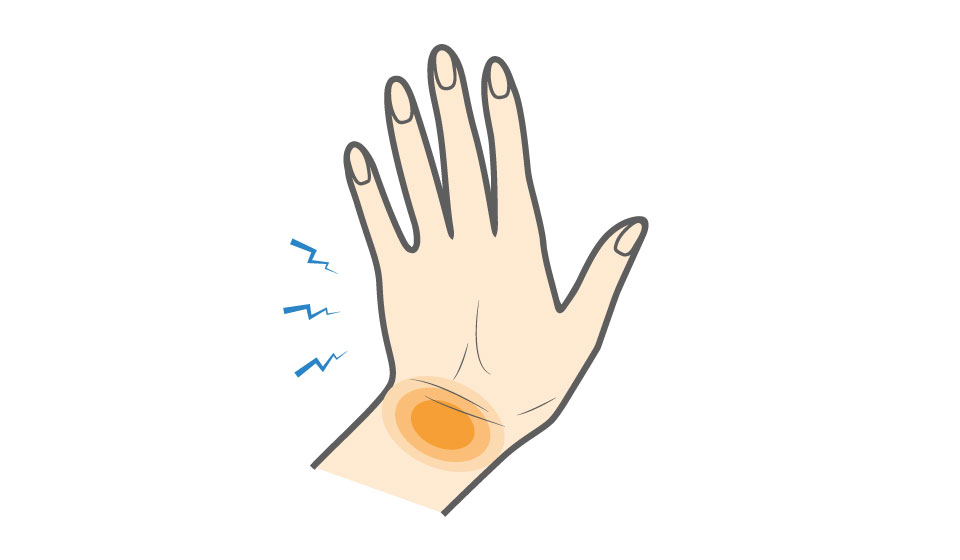A wrist sprain is an injury to the ligaments in the wrist. Ligaments are bands of strong, fibrous tissue that connect the bones of the hand. They also provide stability and strength to the wrist. A wrist sprain occurs when the ligaments are torn or stretched too far. Wrist sprains are common and often result from a sports-related fall injury or hand trauma. Depending on the extent of damage to the ligaments, wrist sprains can range from mild to severe.
Wrist Sprain Causes, Symptoms & Treatment Options
A wrist sprain is an injury to the ligaments in the wrist. Ligaments are bands of strong, fibrous tissue that connect the bones of the hand. They also provide stability and strength to the wrist. A wrist sprain occurs when the ligaments are torn or stretched too far
Overview
Overview

What causes Wrist Sprain?
Wrist sprains can occur when an athlete falls onto their outstretched hand or in any way that stretches their wrist too far, often resulting in a wrist ligament injury.
• Basketball
• Baseball
• Softball
• Gymnastics
• Football
• Rugby
Symptoms
Wrist sprains usually cause pain and wrist swelling. Athletes may also experience:
• Tenderness to the touch
• Pain with motion
• Bruising
• A popping feeling when moving the wrist
When to see a doctor
A minor wrist sprain may get better with home care. But if pain and wrist swelling persist for more than 24 hours, you may have a more severe injury, like a fracture. In this case, you should schedule an appointment with your doctor. At your visit, it is essential to provide the details of your injury, the sports you play, and if you have had previous hand trauma. This information will help your doctor make a diagnosis.
Your doctor will physically examine your wrist, hand, and forearm, looking for signs of wrist swelling and tenderness. X-rays may be ordered to help evaluate the extent of your wrist ligament injury and see if you have broken any bones.
Non-operative treatment
While common, wrist sprains are also highly treatable with non-surgical measures. Taking a break from sports that caused your fall injury is important to allow your wrist time to heal. Additional conservative treatments may include:
- Applying ice to reduce wrist swelling and pain
- Keeping your wrist elevated, especially at night, to reduce swelling
- Taking anti-inflammatory medication (e.g., aspirin, ibuprofen, or naproxen) for pain
- For more severe cases, wearing a wrist splint to immobilize the wrist and allow it to heal
- Stretching and strengthening exercises after the wrist ligament injury have healed
Try these exercises to help address your condition:
Below is a PDF of the exercise program.
Surgical Treatment
Surgical treatment is generally not needed for wrist sprains. If you have severely torn ligaments or a fractured wrist, your doctor will advise whether surgery should be considered, especially in cases involving complex hand trauma.
Recovery
In general, recovery time for a wrist ligament injury can range from days to several weeks, depending on the severity of the sprain. Athletes may consider an alternative physical activity (e.g., swimming or jogging) to avoid re-injuring their wrist and give it ample time to heal fully. Your doctor may suggest specific exercises to expedite recovery and reduce pain and swelling.
GET BACK TO WHAT YOU LOVE. FASTER
Frequently Asked Questions
What’s the best immediate treatment?
- Rest: Avoid weight-bearing or aggravating movements.
- Ice: Apply for 15–20 mins every 2–3 hours (use a cloth barrier to protect skin).
- Compression: Wrap with an elastic bandage for support (not too tight!).
Should I wear a brace or splint?
Yes—a wrist brace or splint helps stabilize the joint during healing. Ask your doctor about:
- How long to wear it (usually a few weeks for moderate sprains).
- When to remove it (some braces allow limited movement for recovery).
How long until a sprained wrist heals?
- Mild (Grade 1): 1–2 weeks.
- Severe (Grade 2–3): Several weeks to months.
What’s the most commonly sprained joint?
Ankle sprains are #1, but wrist sprains are also frequent, especially from falls or sports.

